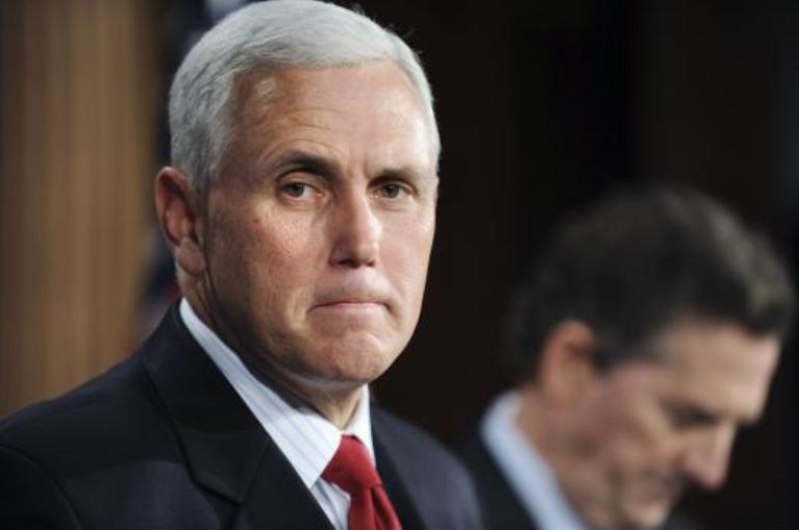
Republican vice presidential running mate of Donald Trump, Mike Pence, has had a "strange" religious conversion narrative, according to Indiana-based author Craig Fehrman, who is working on a book about presidents for Simon & Schuster. While Pence grew up in a big Irish Catholic family of Democrats in central Indiana, serving as an altar boy, attending parochial schools and idolizing John F. Kennedy, he converted to evangelical Christianity through the influence of a nondenominational fellowship group in 1978, while a freshman at Indiana's Hanover College.
"I simply made a personal decision for Christ," Fehrman said Pence told him in 2012, when he was working on a profile of him after he'd won the gubernatorial race.
One of Pence's many former slogans is that he's "a Christian, a conservative, and a Republican, in that order"-and "there's no doubt that he loves his family, his state, and his God," Fehrman wrote about Pence in a 2013 piece.
Fehrman said Pence after college kept attending Mass and worked as a youth minister at a Catholic church. Pence reportedly even applied to Washington, D.C.'s Catholic University with plans to become a priest.
As late as 1994, Pence still described himself as "a born-again, evangelical Catholic."
Fehrman asserts that Pence's ideological beliefs however didn't always define his politics. Pence voted for U.S. President Jimmy Carter because of his faith, but he still voted Democratic. Even when Pence ran for Congress in 1988 and 1990, in the twilight of the Ronald Reagan era, Fehrman said Pence didn't link his politics and his faith. "Both campaigns focused more on his opponent's lucrative reliance on PACs than on anything remotely religious," stated Fehrman.
After losses, Pence stepped away from politics. He ran an Indiana think tank, then created a talk-radio show. During this period, Pence's faith also solidified, according to Fehrman.
In the mid-1990s, Pence started taking his family to an evangelical megachurch in Indianapolis, Fehrman wrote in Slate. Fehrman believes Pence began to approach politics with a more activist bent, as abortion replaced special-interest cash as a chief matter of concern.
Asked in 1995 to name the one person he'd like to have dinner with, Pence replied: "Jesus Christ."
When Pence returned to Congress in 2000, Fehrman said it was clear Pence had changed. "He won the seat and held on for the next 12 years, eventually rising to third in the GOP's congressional leadership. But his faith stayed front and center," reported Fehrman. Pence refused to campaign on Sundays. He also declined to dine solo with women who weren't his wife. "It's about building a zone around your marriage," he told the Hill.
After 9/11, Pence's first reaction was to gather his staff in prayer. Aides and other politicians often saw him reading his Bible, and Pence would cite specific verses to justify policy arguments. "My support for Israel stems largely from my personal faith," he told Congressional Quarterly in 2002. "In the Bible, God promises Abraham, 'Those who bless you I will bless, and those who curse you I will curse.' "
Fehrman said something about Pence changed when he ran for governor of Indiana. "You could no longer get Pence to address his faith, past or present. When I interviewed him in 2012, I asked about the peculiarities in his religious biography; each time, he evaded. Could he help me understand his strange spiritual journey?" posed Fehrman.
"I cherish my Catholic upbringing," Pence replied.
When Fehrman asked Pence to explain why his faith shifted again in the mid-1990s, Pence said his family "just felt drawn to worship at an evangelical church."
Could he define himself as a believer? "I'm a pretty ordinary Christian, trying to make that faith real every day," Fehrman said was Pence's response.
Fehrman said Pence's sudden about-face "was all by design."
While reporting Pence's profile, Fehrman said he learned of a private meeting Pence held in the fall of 2010. "With his closest aides, he'd plotted out how to run for governor-and how to downplay a record in Congress that included trying to defund Planned Parenthood and trying to block the repeal of 'Don't Ask, Don't Tell,' among other social-conservative stands. Instead of highlighting those stands, as at least one adviser had urged him to do, Pence decided to sell himself as a technocratic 'jobs and schools' candidate," according to Fehrman.
When Fehrman asked Pence about the special meeting, he replied, "It was a private meeting."
Once elected, Pence began pushing a very different agenda, according to Fehrman. "While the most notorious example came when he signed the state's Religious Freedom Restoration Act in 2015, Pence's faith has driven decisions big and small. It led him to sign a new anti-abortion law so restrictive that the American Civil Liberties Union is now suing the state. It led him to award a $3.5 million contract to Real Alternatives, a nonprofit that pushes abstinence education and urges pregnant women not to abort," stated Fehrman in Slate.
Fehrman points to Pence's beliefs shifting at least twice-from his family's Catholicism to an idiosyncratic evangelical Christianity, and from that to a more hardened and ideological version of the same. "If, as he insists, faith does indeed order his life, why did he stop being so open about it? Why strip the evangelizing from his evangelicalism?" the author posed.
"The easiest answer seems to be that he decided that as his political ambitions grew his public religiosity needed to shrink."







